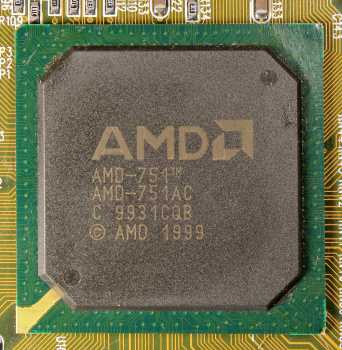AMD 751 (System Controller (Irongate))
Release date
File
Logs
Name
Version
OS support
Size
Filename
Name
Version
5.33
OS support
Size
609.9KB
Filename
Name
Version
4.80
OS support
Size
267.6KB
Filename
Name
Version
1.30
OS support
Size
2.7MB
Filename
AMD-751
The AMD-751 System Controller is a critical component of the AMD-750 chipset, designed to provide enhanced performance for systems powered by the AMD Athlon processor and other compatible processors. This controller integrates several key features and functionalities:
-
AMD Athlon System Bus:
- Utilizes a high-performance point-to-point system bus topology.
- Employs source-synchronous clocking for high-speed data transfers.
- Adopts HSTL-like low-voltage swing transceiver logic signal levels.
- Features three independent high-speed channels, including a processor request channel, a system probe channel, and a data transfer channel.
- Achieves peak data transfer rates of 1.6 gigabytes per second at 200 MHz.
- Supports large 64-byte data burst transfers.
- Implements various data buffers, including memory write and read FIFOs and PCI/APCI write and read buffers.
- Utilizes transaction queues such as command queue (CQ), memory write queue (MWQ), memory read queue (MRQ), and probe (snoop) queue (PQ).
-
Integrated Memory Controller:
- Includes a Memory Request Organizer (MRO) that optimizes scheduling of memory requests.
- Supports various concurrences, including processor-to-main-memory with PCI-to-main-memory and AGP-to-main-memory.
- Provides memory error correcting code (ECC) support.
- Supports up to three non-buffered PC-100 Rev. 1.0 SDRAM DIMMs with flexible row and column addressing.
- Allows for up to 768 megabytes of memory.
- Features four open pages within one CS (chip select) for one quadword and supports a default two-page leapfrog policy for eight quadword requests.
-
PCI Bus Controller:
- Complies with the PCI Local Bus Specification, Revision 2.2.
- Supports up to six PCI masters.
- Utilizes a 32-bit interface compatible with both 3.3-V and 5-V PCI I/O.
- Operates synchronously up to 33 MHz.
- Features automatic processor-to-PCI burst cycle detection.
- Includes FIFOs to enhance performance, with zero wait-state PCI initiator and target burst transfers.
- Supports various PCI command optimizations.
- Ensures fair arbitration between PCI initiators using timers.
- Allows for retry disconnect to improve bus utilization.
-
AGP Features:
- Complies with AGP 2.0 specification.
- Supports synchronous 66-MHz 1x and 2x data-transfer modes.
- Utilizes separate read-request and write-request queues.
- Implements reordering of high-priority requests.
- Includes transaction queues for memory-to-AGP and processor-to-AGP operations.
- Features FIFOs for AGP-to-memory write and memory-to-AGP read operations.
- Utilizes a conventional GART (graphics address remapping table) scheme with associated caches.
-
Power Management:
- Supports power management compliance for both ACPI and Microsoft PC 98 power management standards.
- Provides support for various power states, including Processor Halt/Stop Grant/Sleep states and Power-On Suspend.
Last updated 2025-03-31T22:30:52Z
Disclaimer
The info found in this page might not be entirely correct. Check out this guide to learn how you can improve it.
 Image 1 of 1 (computerguy096)
Image 1 of 1 (computerguy096)